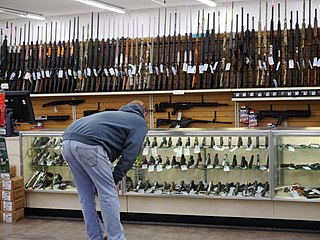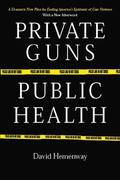Related Research Articles

Gun control, or firearms regulation, is the set of laws or policies that regulate the manufacture, sale, transfer, possession, modification, or use of firearms by civilians.

The right to keep and bear arms is a legal right for people to possess weapons (arms) for the preservation of life, liberty, and property. The purpose of gun rights is for self-defense, as well as hunting and sporting activities. Countries that guarantee a right to keep and bear arms include Albania, Czech Republic, Guatemala, Mexico, the Philippines, Switzerland, Ukraine, the United States and Yemen.
Arthur L. Kellermann is an American physician and epidemiologist. Until his resignation in November 2022, he served as a professor of emergency medicine at the VCU School of Medicine, senior vice president of health sciences for Virginia Commonwealth University, and CEO of the VCU Health System. He was formerly professor and dean of the F. Edward Hébert School of Medicine at the Uniformed Services University of the Health Sciences. Kellerman served as director of the RAND Institute of Health and founded the department of emergency medicine at Emory University and the Center for Injury Control at Rollins School of Public Health. His writings include 200 publications on various aspects of emergency cardiac care, health services research, injury prevention and the role of emergency departments in providing health care to the poor. Kellermann is known for his research on the epidemiology of firearm-related injuries and deaths, which he interpreted not as random, unavoidable acts but as preventable public-health priorities. Kellermann and his research have been strongly disputed by gun rights organizations, in particular by the National Rifle Association of America, although Kellermann's findings have been supported by a large body of peer-reviewed research finding that increasing gun ownership is associated with increased rates of homicide and violence.

Gun politics in the United States is characterized by two primary opposing ideologies regarding private firearm ownership.
A suicide method is any means by which a person may choose to end their life. Suicide attempts do not always result in death, and a non-fatal suicide attempt can leave the person with serious physical injuries, long-term health problems, or brain damage.

Suicide prevention is a collection of efforts to reduce the risk of suicide. Suicide is often preventable, and the efforts to prevent it may occur at the individual, relationship, community, and society level. Suicide is a serious public health problem that can have long-lasting effects on individuals, families, and communities. Preventing suicide requires strategies at all levels of society. This includes prevention and protective strategies for individuals, families, and communities. Suicide can be prevented by learning the warning signs, promoting prevention and resilience, and committing to social change.

Gun violence is a term of political, economic and sociological interest referring to the tens of thousands of annual firearms-related deaths and injuries occurring in the United States.

Gun-related violence is violence against a person committed with the use of a firearm to inflict a gunshot wound. Gun violence may or may not be considered criminal. Criminal violence includes homicide and assault with a deadly weapon. Depending on the jurisdiction, suicide or attempted suicide may also be considered a crime. Non-criminal violence includes accidental or unintentional injury and death. Also generally included in gun violence statistics are military or para-military activities.

This is a list of US states by gun deaths and rates of violence. In 2021, there were 26,000 gun suicides and 21,000 gun homicides, together making up a sixth of deaths from external causes. Gun deaths make up about half of all suicides, but over 80% of homicides.

In 2018, the Small Arms Survey reported that there are over one billion small arms distributed globally, of which 857 million are in civilian hands. The survey stated that USA civilians account for an estimated 393 million of the worldwide total of civilian held firearms, or about 120.5 firearms for every 100 American residents.

Private Guns, Public Health is a 2004 policy opinion book by David Hemenway, an economist who has served as Professor of Health Policy at the Harvard School of Public Health as well as the Director of Harvard's Injury Control Research Center. He argues that the widespread ownership of firearms in private hands in the U.S. promotes the spread of the "disease" of gun violence, and he takes a collective interpretation of the Second Amendment while stating that increased regulations are absolutely necessary in the purposes of public safety. Hemenway makes the central case that "more guns in a community lead to more homicide". He published the book through the University of Michigan Press in 2004. A new edition was released, also by the University of Michigan Press, in 2017.

Defensive gun use (DGU) is the use or presentation of a firearm for self-defense, defense of others or, in some cases, protecting property. The frequency of incidents involving DGU and their effectiveness in providing safety and reducing crime are controversial issues in gun politics and criminology, chiefly in the United States. Different authors and studies employ different criteria for what constitutes a defensive gun use which leads to controversy in comparing statistical results. Perceptions of defensive gun use are recurring themes in discussions over gun rights, gun control, armed police, open and concealed carry of firearms.

A universal background check for guns is a policy that requires a background check for all gun sales or transfers, regardless of where they occur or who is involved. This includes sales at gun shows, private sales between individuals, and sales made online. The idea is to close loopholes in existing laws that currently allow some gun purchases to occur without background checks.
Michael B. Siegel is an American tobacco control researcher and public health researcher. He is a professor of community health sciences at the Boston University School of Public Health.
Fred Rivara is a professor of pediatrics and epidemiology at the University of Washington at Seattle Children's Hospital known for his research into the relationship between gun ownership and gun violence in the 1990s. Rivara has also researched bicycle helmets, intimate partner violence, and alcohol abuse, among other topics.
The National Firearms Agreement (NFA), also sometimes called the National Agreement on Firearms, the National Firearms Agreement and Buyback Program, or the Nationwide Agreement on Firearms, was an agreement concerning firearm control made by Australasian Police Ministers' Council (APMC) in 1996, in response to the Port Arthur massacre that killed 35 people. Four days after the killings, Australian Prime Minister John Howard told Parliament “We need to achieve a total prohibition on the ownership, possession, sale and importation of all automatic and semi-automatic weapons. That will be the essence of the proposal that will be put by the Commonwealth government at the meeting on Friday...". The APMC would agree to and form the NFA 12 days after the massacre on the 10th of May 1996.
Daniel W. Webster is an American health policy researcher and the distinguished research scholar of the Johns Hopkins Center for Gun Violence Solutions at Johns Hopkins Bloomberg School of Public Health. He is also the deputy director for research at the Johns Hopkins Center for the Prevention of Youth Violence, and the first Bloomberg Professor of American Health at the Johns Hopkins Bloomberg School of Public Health. In 2016, he became the director of the Johns Hopkins-Baltimore Collaborative for Violence Reduction, a joint crime-fighting effort between Johns Hopkins and the Baltimore Police Department.
A child access prevention law makes it illegal for an adult to keep a gun in a place and manner so that a child can easily access and fire it. Proponents of these laws, such as the Law Center to Prevent Gun Violence in the United States, argue that they are effective at reducing accidental gun deaths among children, since they reduce accessibility and thereby risk. The National Rifle Association of America has lobbied against such laws, arguing that they are ineffective and infringe on the rights of gun owners to protect their homes.

Mass shootings are incidents involving multiple victims of firearm related violence. Definitions vary, with no single, broadly accepted definition. One definition is an act of public firearm violence—excluding gang killings, domestic violence, or terrorist acts sponsored by an organization—in which a shooter kills at least four victims.

The Bipartisan Background Checks Act is a proposed United States law that would establish new background check requirements for firearm transfers between private parties. It would prohibit a firearm transfer between private parties until a licensed gun dealer, manufacturer, or importer conducts a successful background check.
References
- 1 2 "Matthew Miller". Faculty and Researcher Directory. Harvard School of Public Health. 5 January 2021.
- ↑ "State-wide gun ownership tied to suicide deaths". FoxNews.com. Reuters. 27 September 2013.
- ↑ Beckett, Lois (19 September 2016). "Gun inequality: US study charts rise of hardcore super owners". The Guardian.
- ↑ Seaman, Andrew (6 January 2017). "About one-fifth of gun buyers don't get background checks". Reuters.
- ↑ Painter, Kim (28 April 2014). "High antidepressant dose linked to self harm in youths". USA Today.